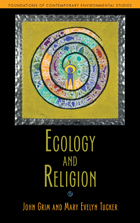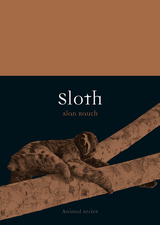


This primer explores the history of religious traditions and the environment, illustrating how religious teachings and practices both promoted and at times subverted sustainability. Subsequent chapters examine the emergence of religious ecology, as views of nature changed in religious traditions and the ecological sciences. Yet the authors argue that religion and ecology are not the province of institutions or disciplines alone. They describe four fundamental aspects of religious life: orienting, grounding, nurturing, and transforming. Readers then see how these phenomena are experienced in a Native American religion, Orthodox Christianity, Confucianism, and Hinduism.
Ultimately, Grim and Tucker argue that the engagement of religious communities is necessary if humanity is to sustain itself and the planet. Students of environmental ethics, theology and ecology, world religions, and environmental studies will receive a solid grounding in the burgeoning field of religious ecology.

The scientific, political, and economic policy debates about the global environmental crisis have tended to ignore its historical, ethical, religious, and aesthetic dimensions. This book redresses that omission by highlighting these humanistic components that are integral to the fabric of our ecological understanding and, consequentially, essential to a broad, multidisciplinary approach to environmental studies and public policy initiatives.
In this slim volume, seven world-class scholars discuss the wide range of perspectives that the fields of literature, history, religion, philosophy, environmental ethics, and anthropology bring to the natural environment and our place in it. The preface summarizes the development of the religion and ecology movement; the editor’s critical introduction highlights the essays’ major themes. Bringing insights from the humanities to bear on ecological concerns, this volume will appeal to a wide audience in the humanities and environmental studies, policy makers, and the general public. The book represents a continuation of the Center for the Study of World Religions’ highly regarded Religions of the World and Ecology series.

This fourth volume in the series exploring religions and the environment investigates the role of the multifaceted Hindu tradition in the development of greater ecological awareness in India.
The twenty-two contributors ask how traditional concepts of nature in the classical texts might inspire or impede an eco-friendly attitude among modern Hindus, and they describe some grassroots approaches to environmental protection. They look to Gandhian principles of minimal consumption, self-reliance, simplicity, and sustainability. And they explore forests and sacred groves in text and tradition and review the political and religious controversies surrounding India’s sacred river systems.

Many scientists today think of the universe as essentially purposeless. Likewise, modern and postmodern philosophers have often been suspicious of any religious claims that the natural world embodies and eternal meaning or teleology. Not all scientific thinkers subscribe to this cosmic pessimism, however, and some would even argue that contemporary knowledge is consistent with a religious sense of cosmic purpose.
This stimulating book offers candid reflections on the question of cosmic purpose written both by prominent scientists and by scholars representing the world's religious traditions. Examining the issue from a wide variety of perspectives, this is the only current book to deal with cosmic purpose from an interreligious and interdisciplinary perspective.
Here scientists such as physicist Andrei Linde and biologist Francisco Ayala come face to face with Islamic scholar Seyyed Hossein Nasr, Hindu philosopher Anindita Niyogi Balslev, and others. They examine such perplexing issues as the possible existence of multiple universes and the implications of seemingly purposive features in life. The contributions address the question of whether a religiously-based notion of a purposeful cosmos is consistent with the latest scientific understanding of nature, and whether theology can affirm the presence of divine action without contradicting science.
These essays will challenge readers to ponder their own place in the cosmos as they seek to interpret the visions of the world's great spiritual traditions in the light of natural science.
READERS
Browse our collection.
PUBLISHERS
See BiblioVault's publisher services.
STUDENT SERVICES
Files for college accessibility offices.
UChicago Accessibility Resources
home | accessibility | search | about | contact us
BiblioVault ® 2001 - 2024
The University of Chicago Press









